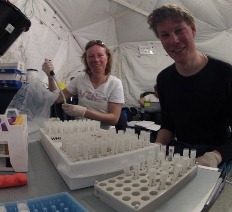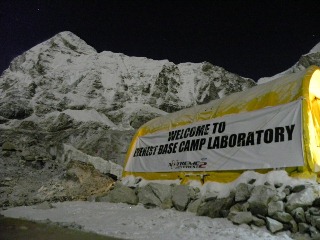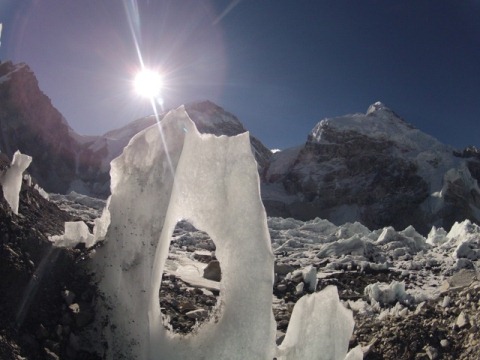 Two months into a research expedition to Mount Everest, Extreme Physiology & Medicine Editor-in-Chief Mike Grocott, reports from the trip. Researchers on the Xtreme Everest 2 expedition are comparing Sherpa and “lowlander” physiology.
Two months into a research expedition to Mount Everest, Extreme Physiology & Medicine Editor-in-Chief Mike Grocott, reports from the trip. Researchers on the Xtreme Everest 2 expedition are comparing Sherpa and “lowlander” physiology.
 The Sherpas are a group known to perform extraordinarily well at altitude. The team record the physiological responses of healthy individuals in this extreme environment – low oxygen levels at high altitude – and apply this research to patients in intensive care. This is very much in line with the Extreme Physiology & Medicine’s objectives, outlined in its launch editorial, to explore boundary physiology and translate research findings into a clinical setting.
The Sherpas are a group known to perform extraordinarily well at altitude. The team record the physiological responses of healthy individuals in this extreme environment – low oxygen levels at high altitude – and apply this research to patients in intensive care. This is very much in line with the Extreme Physiology & Medicine’s objectives, outlined in its launch editorial, to explore boundary physiology and translate research findings into a clinical setting.
Mike provided this update:
“All our recruited subjects have now been tested at Everest Base Camp. We still have a few days of investigator testing, but once this is complete we will start to decommission the Base Camp laboratory. The team have done a brilliant job under often difficult conditions.”
T he Xtreme Everest 2 team are keeping the wider world updated with a lively blog, twitter feed and plenty of pictures.
he Xtreme Everest 2 team are keeping the wider world updated with a lively blog, twitter feed and plenty of pictures.
Other expedition core team members include Extreme Physiology & Medicine Deputy Section Editors Dan Martin, Denny Levett and Phil Hennis, and other Editorial Board members are represented in the science and advisory teams too.
The project doesn’t finish at the end of the expedition in Nepal. Expedition leader Dan Martin praised the efforts of everyone involved in the mission and highlighted the next steps:
“We cannot express enough our thanks to all our volunteer subjects and the fantastic team for making this unique experiment possible. Collecting this data in the field is the beginning of a long journey of translation into the clinical environment that we hope will ultimately lead to improved care of critically ill patients.”

[…] more in a previous post about Xtreme Everest 2. #gallery-2 { margin: auto; } #gallery-2 .gallery-item { float: left; […]
New related post, including slideshow of pictures from the trip:
‘Double celebration for Xtreme Everest 2 expedition’ – available to read at https://finaloriginalblogs.dev/bmcblog/2013/05/28/double-celebration-for-xtreme-everest-2-expedition
See a newer post about Xtreme Everest 2 –
Double celebration for Xtreme Everest 2 expedition – at https://finaloriginalblogs.dev/bmcblog/2013/05/28/double-celebration-for-xtreme-everest-2-expedition. Includes a slideshow of photos from the expedition.